




 )
)
Living in Anjou , France,
For the many not for the few
http://www.permies.com/t/80/31583/projects/Permie-Pennies-France#330873




Author 'Perennial Vegetables', co-author 'Edible Forest Gardens'.
Website - http://www.perennialsolutions.org/




http://www.elizabethu.com
Food, Finance, Building Connections, Asking Big Questions, Making Amazing Things Happen




 as Eric summised its spending and investing ethically . Basically what I was trying to ask in an indirect way was do you agree with me that people both spend and invest ethically and by this I think of as locally , sustainably and by this I mean organically in order to promote change . Do you see yourself as part of this possible change?
as Eric summised its spending and investing ethically . Basically what I was trying to ask in an indirect way was do you agree with me that people both spend and invest ethically and by this I think of as locally , sustainably and by this I mean organically in order to promote change . Do you see yourself as part of this possible change?
Living in Anjou , France,
For the many not for the few
http://www.permies.com/t/80/31583/projects/Permie-Pennies-France#330873




 ...as a way to promote change. So it sounds like we're in agreement there
...as a way to promote change. So it sounds like we're in agreement there 
Inspired by Woody Tasch's book Inquiries into the Nature of Slow Money: Investing As If Food, Farms and Fertility Mattered, published in 2009, the Slow Money Alliance is bringing people together around a new conversation about money that is too fast, about finance that is disconnected from people and place, about how we can begin fixing our economy from the ground up... starting with food.
Through Slow Money national gatherings, regional events and local activities, more than $35 million has been invested in over 300 small food enterprises around the United States since mid-2010. Nineteen local Slow Money chapters and 10 investment clubs have formed. Slow Money events have attracted thousands of people from 36 states and 9 countries. Over 34,000 people have signed the Slow Money Principles. The first international Slow Money investment—a $20,000 loan to a solar dairy in Switzerland—has been made. Slow Money France is in the early stages of organizing, and inquiries about chapter formation have been received from Canada, Australia and Japan.
Spirit… The primary role of money is to serve the highest intentions of the human spirit.
Trust… People are best served by financial transactions that are direct, transparent, and personal, based on long-term relationships.
Interdependence… Economic success will be defined by social and ecological impact, not by financial results alone.
Community… Networks and associations will be increasingly important in the circulation of money.
Innovation… A deeply entrepreneurial culture is required to generate breakthrough ideas at the intersection of social change and finance.
Equality… All those seeking to align their values with their money will have access to opportunities for investing, lending, and giving.
http://www.elizabethu.com
Food, Finance, Building Connections, Asking Big Questions, Making Amazing Things Happen

|
Do or do not. There is no try. --Yoda ... this tiny ad thinks Yoda is a dumbass:
Looking for cold-climate growers to join a GOOF livestream panel (Missoula)
https://permies.com/t/369111/cold-climate-growers-join-GOOF
|




